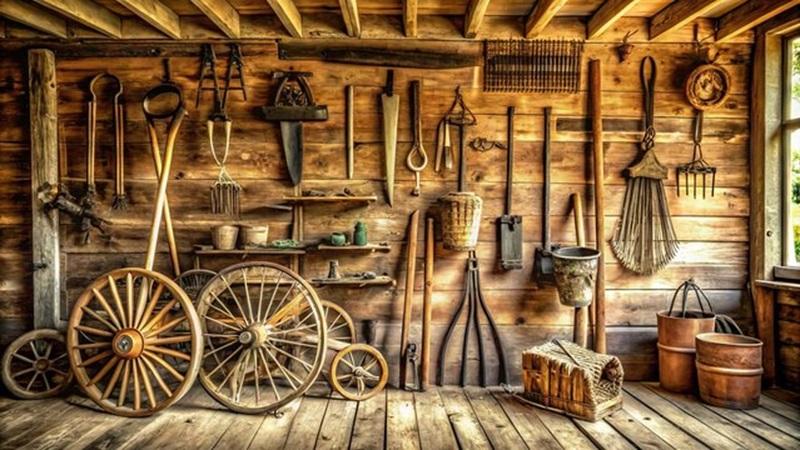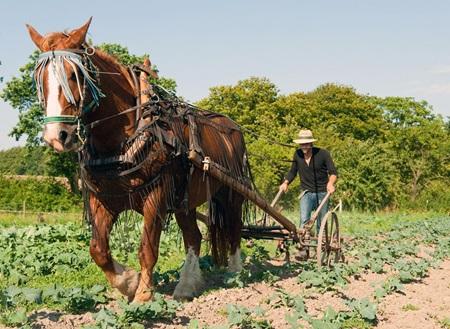Isaiah 28:26 – Farmers, City Dwellers and Others: Pupils of God
Isaiah 28:26 – Farmers, City Dwellers and Others: Pupils of God
For He instructs him in right judgment His God teaches him.
Isaiah 28:26

Isaiah tells us the story of the farmer and of the work he does. The methods and implements used by the farmer are many and varied. He ploughs, furrows and seeds; he harvests and thrashes, and each of these differ according to each particular crop (verses 23-29). That is Isaiah's story.
The Objective⤒🔗
A parable is a story with a message, as were the parables the Lord Jesus told. They hold a hidden truth. With parables you can get caught. Think of Nathan and the story of the lamb, which he told David, to help him realise his sin with Bathsheba and Uriah. When the Pharisees had heard the parable of the wicked vine dressers in Matthew 21:45, we read: "…they perceived that he was speaking of them." A parable has a special meaning. Like the farmer in Isaiah employs a variety of work practices, the Lord also has different ways of dealing with his people. The furrows He cuts in the life of one of His children is deeper than of another (verse 29). This too comes from the Lord of hosts, Who is wonderful of council and great in prudence.
Agrarian Wisdom←⤒🔗
The farmer of verse 26 performs his many varied tasks with the necessary knowledge and skill. He does not keep ploughing without purpose, Isaiah tells us. How does the farmer know that? God has taught him. He taught him that different crops need different management. The farmer works with the wagon wheel and the thrashing disc, with its sharp points. These are placed on top of each other, with the ears of grain between, then turned in opposite directions. Thus the grain is eased from the ears. However that needed care, for too much turning would pulverise it.
And the farmer would not even consider using this method for the dill of cumin. These tiny grains were eased out of their husks with a stick. Whence all this technical know-how in agriculture? Answer: God taught the farmer.
Which Book?←⤒🔗
How did He teach him? Did the farmer read all that in the Bible? No, the Bible is not an agricultural instruction manual. Did God then whisper it to the farmer in the still of the night? No, it does not work like that. God is near us with His word. "The Word is near you." (Romans 10). However God also gave man another book to read, the book mentioned in article 2 of the Belgic Confession. This article tells us that we know God by two means:
First by the creation, preservation and government of the universe; which is before our eyes as a most beautiful book, wherein all creatures, great and small, are as so many letters, leading us to God, namely, His eternal power and deity, as the apostle Paul says in Romans 1:20.

That is the book read by me farmer; God's creation, which He continues to maintain. This the farmer has researched, has worked with, and has discovered everything through experience. God, who made everything "according to its kind" and who preserves everything "according to its kind", has instructed the farmer from the book of nature. From that book the farmer came to know the vegetation and its crops, and what to do with it. The farmer passed it on to the son who took over from him. The discoveries were noted down and so technical literature came into being. Today we know agriculture education on many levels. Still today, God educates the farmer from the book of nature.
Bound←⤒🔗
God does not only teach him from the book of nature, He also binds him to it. The farmer who has taken his work practices, locations and times, from that book, simply has to stick to them. He is bound to the ordinances of God's creation. He must follow… follow God. If the farmer were to treat dill like he treated the barley, things will go wrong. The farmer is tied to whatever God created and how He is pleased to preserve it. He is not a slave of the natural laws, as if they just happened. Nothing just happened. The farmer is and continues to be tied to the reality of God's creation. Tied to God and the work of His hands. The farmer is tied to that for the duration of his life. Even the times of the church services are adapted to that. Not the other way around: Cows do not consider church services.
City Dwellers and Others←⤒🔗
If it is true that we are bound to God's creation and to the way in which He preserves it day by day, then we can cast our eye farther than just the fields, meadows and stables. God not only supplies vegetation and animals, He has also royally supplied His earth with countless stores of materials: gas, rain forests, ores and minerals. The earth does not only bring forth vegetables, but fossil fuels; as well as the charcoal, with which the artist produces such beauty. All the earth has to offer is there to work with. Not only its edible vegetation, but is metals. And what about the wonderful things we have learned to do with wood? For that trade also, technical literature has been developed. Not only vegetation but also the raw materials have been given by God, and are preserved by Him, according to their kind. Therefore not only farmers, but also city dwellers and others are pupils of God. The technician, the doctor, the natural scientist; they too are pupils of God. Tied to God's work of creation. The path of the wheat, from the field, to the sandwich on your plate, is the path of the farmer, the flour mill, baker, supermarket, or grocer.
It requires a progression of specialist workers, and each in his own place is and remains, in spite of all human interference and adaptation; pupil, of God.
Absolutely Everyone←⤒🔗
No-one can escape the truth and the reality of GENESIS 1. Believing people know and confess that. They progress on their path through God's world, praying and giving thanks. They live with their faces towards their Creator.
However, the unbelievers too, can do nothing but live and work in that reality. In their thoughts and actions they live with their backs towards God. Yet, what they see in front of them is nothing but God's world. They will not escape the power of that reality. That is an all-encompassing fact, which shows the greatness of our God.
Reformed Mathematics←⤒🔗
Another conclusion from Isaiah 28: a valid justification for Reformed education.
The baptismal promise as a basis for this is dear. In certain subjects of education, it is indeed self-evident, because principals and convictions are at stake: religion, social studies, history, geography, biology. But what about math's? Is the principle of 2X2 = 4, not the same for both secular, reformed schools? There is no such thing as reformed mathematics, is there?

Yet, some things need to be considered here. Does not the world of Mathematics, its rules, laws, its truth and realities, come from God's own creation? If then we are busy with that God-created reality, does not the LORD have the right of recognition as Creator, as Almighty God, Who, from moment to moment, holds the entire world in His hands?
Only then can we say that we have finished our mathematics, when we have also calculated the world of mathematics towards God. From Him, through Him and to Him are all things.
The Other book←⤒🔗
God has given us another book as well: The Holy Bible.
That book tells us that the world and everything in it, have their being in Christ. Why the regularity of seasons? The never ending routine of seeding and harvest, of cold and heat, summer and winter, day and night? Because God sent His Son into the world to make peace with God, to create a new human race out of the old one, to renew heaven and earth. That is what we need to see and acknowledge in order to do real justice to the truth and the reality of things. We cannot read God's redeeming work in Christ, from a cauliflower. Not a single metal can reveal that to us. Yet, that belief is necessary too, not only to get to know the 'how' of things, but also determine the 'why' of things. Then we know why we live and work in this world: In thankful service to God. Then we are more than pupils of God. Then we are also children of God!

Add new comment